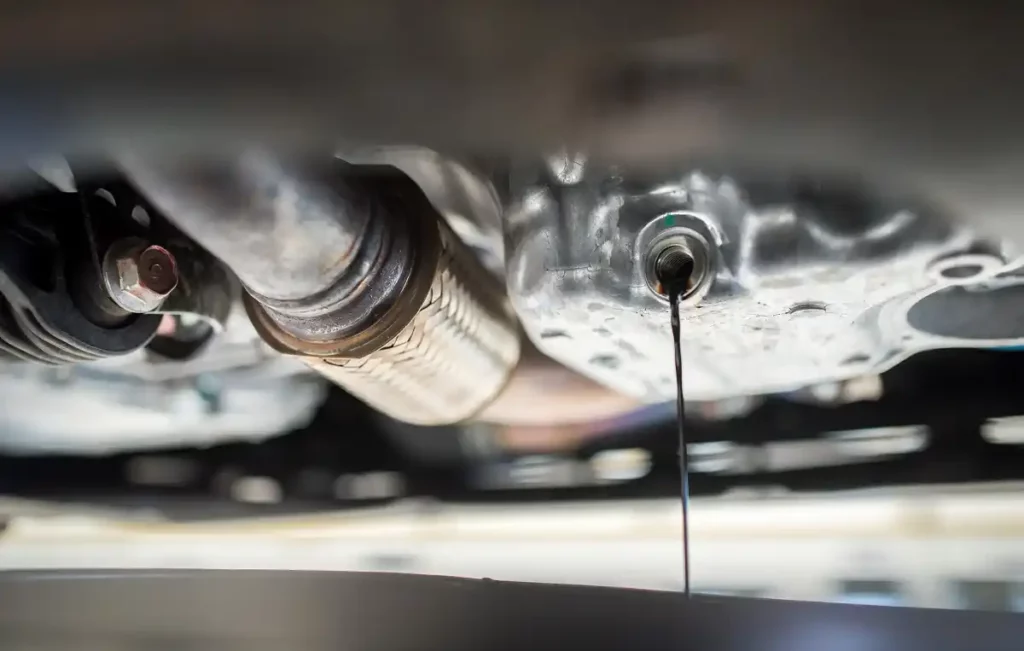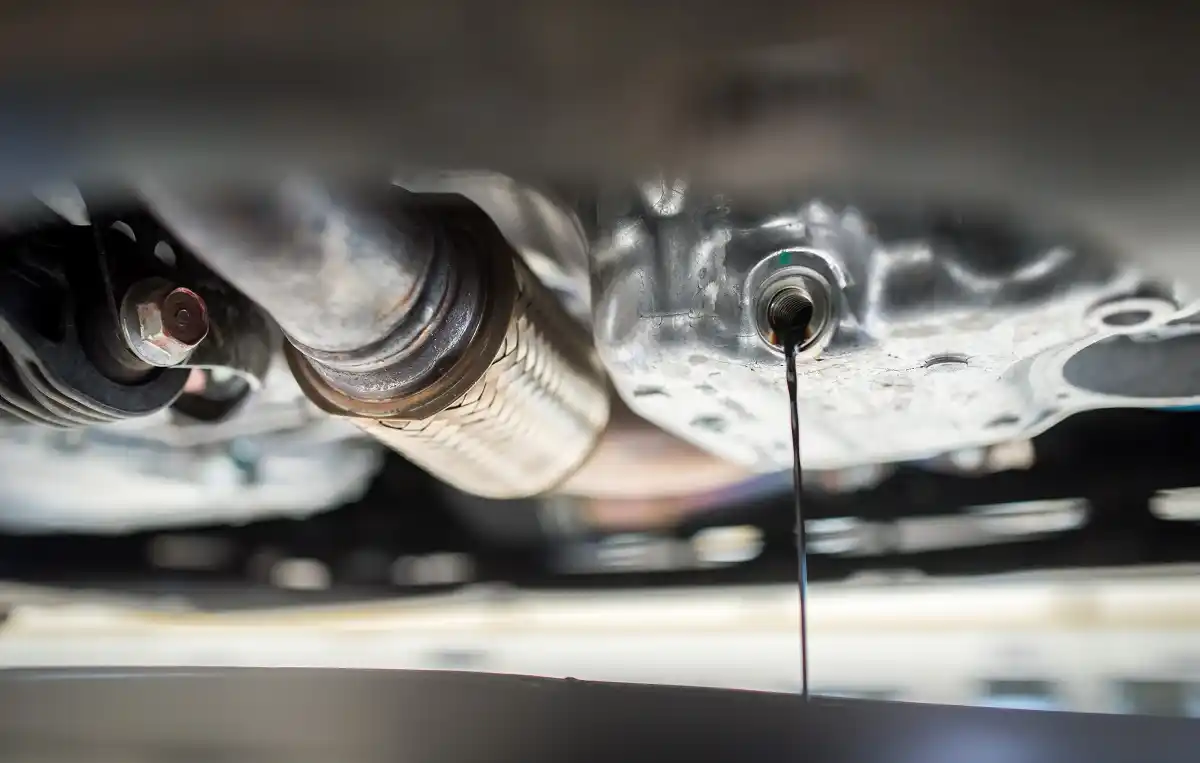Every time you turn the key and start your car, an intricate dance of mechanical precision begins within the engine. From powering your vehicle to delivering a smooth ride, the engine plays a vital role in the overall performance and longevity of your car. To keep this powerhouse running at its best, regular maintenance is essential, and one crucial aspect that should never be overlooked is the timely changing of engine oil.
This article will shed light on why this seemingly simple task holds such importance. By understanding the role of engine oil and its impact on performance, we can grasp the numerous benefits that come with regular oil changes. From improved engine efficiency to prolonged engine life, a small act like changing the oil can make a world of difference.

Understanding the Role of Engine Oil
Engine oil is the lifeblood of your car’s engine, performing a range of crucial functions that keep the various components working harmoniously. Let’s take a closer look at its primary roles:
Lubrication
Engine oil forms a thin film between moving parts, reducing friction and wear. As the engine operates, hundreds of metal components rub against each other at high speeds. Without proper lubrication, these parts would grind together, leading to increased friction, heat generation, and accelerated wear.
Cooling
The engine generates an immense amount of heat during operation. Engine oil helps dissipate this heat, preventing overheating and potential damage. By absorbing heat from the engine’s internal components, the oil transfers it to the oil pan and through the oil cooler, where it can be released into the surrounding air.
Cleaning
Over time, combustion by-products, dirt, debris, and tiny metal particles accumulate within the engine. Engine oil contains detergents and additives that help clean and suspend these contaminants, preventing them from settling on crucial components. When the oil circulates through the engine, it carries away these particles, keeping the engine clean and free from harmful deposits.
However, as the engine oil performs these vital functions, it gradually degrades and becomes contaminated. Continuous exposure to high temperatures, combustion gases, and the accumulation of impurities diminish its effectiveness. This is why regular oil changes are necessary to maintain optimal engine health and performance.
Importance of Using Quality Engine Oils Such as Motul 8100

When it comes to choosing the right engine oil for your vehicle, quality matters. Opting for high-quality engine oils, such as the Motul 8100 series oils, can significantly impact the longevity and performance of your engine. Here’s why using quality engine oils is crucial:
Superior Lubrication and Wear Protection
Engine oils like the Motul 8100 series are formulated with advanced additives and high-quality base oils. These oils provide exceptional lubrication, ensuring that engine components move smoothly and experience minimal friction. This reduces wear and tear on critical engine parts, such as pistons, camshafts, and bearings, helping to extend their lifespan.
Explore the Motul 8100 line of engine oils and find the right one for your car!
Excellent Heat Resistance and Thermal Stability
Quality engine oils, such as Motul 8100 series, are designed to withstand high temperatures and maintain their viscosity under extreme operating conditions. This thermal stability prevents oil thinning and oxidation, reducing the risk of engine sludge formation and maintaining optimal lubrication even in demanding environments. By keeping the engine properly lubricated, these oils help prevent overheating and protect against potential engine damage.
Enhanced Engine Cleanliness
The Motul 8100 series engine oils are known for their excellent detergency properties. They contain specialized additives that effectively clean and remove deposits, sludge, and varnish from engine components. By keeping the engine clean, these oils promote optimal performance and prevent the buildup of harmful contaminants that can negatively impact engine efficiency and longevity.
Compatibility with Modern Engine Technologies
Today’s engines are equipped with advanced technologies such as turbochargers, direct fuel injection, and variable valve timing. Quality engine oils like the Motul 8100 series are specifically designed to meet the requirements of these modern engines. They offer enhanced protection against issues such as turbocharger deposits, oil foaming, and valve train wear, ensuring optimal performance and longevity of these advanced engine components.
Manufacturer Approvals and Specifications
The Motul 8100 series and other high-quality engine oils often meet or exceed the stringent specifications and approvals set by vehicle manufacturers. These approvals signify that the oil has undergone extensive testing and meets the performance requirements of specific engine models. Using approved engine oils ensures compatibility and provides peace of mind that your engine is receiving the best possible protection.
Investing in quality engine oils like the Motul 8100 series is an investment in the long-term health and performance of your engine. These oils offer superior lubrication, excellent heat resistance, engine cleanliness, and compatibility with modern engine technologies.
The Benefits of Regular Oil Changes
Regular oil changes offer a host of benefits that go beyond simply replacing old oil with fresh lubrication. Let’s explore the key advantages of adhering to a routine oil change schedule:
Improved Engine Performance
- Enhanced Lubrication — Fresh oil reduces friction between moving parts, allowing them to operate smoothly and efficiently. This optimal lubrication leads to improved engine performance, smoother operation, and reduced strain on the engine.
- Reduced Friction — Friction generates heat, and excessive heat can cause damage to engine components. By regularly changing the oil, you ensure that the engine is adequately lubricated, minimizing friction and heat buildup. This, in turn, helps maintain optimal engine temperature and prevents overheating.
Prolonged Engine Life
- Minimized Wear and Tear — Clean oil provides a protective barrier between engine parts, reducing the wear and tear caused by metal-to-metal contact. By regularly replacing the oil, you prevent excessive wear on critical components, such as the pistons, camshafts, and crankshaft, leading to a longer engine life.
- Prevention of Sludge Formation — Over time, oil can accumulate impurities, moisture, and combustion by-products, forming sludge. This sludge can restrict oil flow, clog passages, and reduce the effectiveness of lubrication. Regular oil changes flush out the old oil, along with any sludge buildup, ensuring that the engine remains clean and free from harmful deposits.
Efficient Heat Dissipation
Fresh oil has better heat dissipation properties, efficiently carrying heat away from the engine components. This helps prevent overheating, which can lead to engine damage and costly repairs.
Enhanced Fuel Economy
Clean oil with optimal viscosity reduces internal engine friction, allowing the engine to run more smoothly. This reduction in friction and drag can contribute to improved fuel efficiency and better mileage.
By prioritizing regular oil changes, you not only optimize your engine’s performance but also safeguard its longevity. The simple act of changing the oil at recommended intervals can save you from costly engine repairs, improve fuel economy, and ensure that your vehicle remains reliable and efficient.
Recommended Oil Change Intervals

Determining the ideal oil change interval for your vehicle depends on several factors, including the type of oil used, driving conditions, and the manufacturer’s recommendations. Here are some general guidelines to consider:
Mileage-Based Intervals
Conventional Oil: Typically, conventional oil should be changed every 3,000 to 5,000 miles (4,800 to 8,000 kilometers).
Synthetic Blend Oil: This type of oil can typically go for 5,000 to 7,500 miles (8,000 to 12,000 kilometers) between changes.
Full Synthetic Oil: Synthetic oils offer superior performance and can last up to 10,000 to 15,000 miles (16,000 to 24,000 kilometers) or more between changes.
Keep in mind that even though synthetic oils have come a long way, you should always stick to your car manufacturer’s recommendations.
Time-Based Intervals
Even if you haven’t reached the mileage threshold, it is generally recommended to change the oil at least once a year to prevent oil degradation and maintain its effectiveness.
Manufacturer Recommendations
Always refer to your vehicle’s owner’s manual for specific oil change intervals recommended by the manufacturer. They have extensive knowledge of your vehicle’s engine and can provide the most accurate guidance.
It’s important to note that certain driving conditions may require more frequent oil changes. Consider the following factors that may necessitate shorter oil change intervals:
- Severe Driving Conditions — If you frequently drive in extreme temperatures, stop-and-go traffic, or dusty environments, the engine may experience more stress. In such cases, it is advisable to change the oil more frequently to ensure optimal engine protection.
- Towing or Hauling — If you regularly tow heavy loads or haul cargo, the engine works harder and generates more heat. Consequently, more frequent oil changes are recommended to keep the engine properly lubricated and cooled.
By following the recommended oil change intervals and taking into account specific driving conditions, your engine will have everything it needs to keep running smoothly for years to come.
Signs of Overdue Oil Change
While following the recommended oil change intervals is crucial, it’s also essential to pay attention to signs that indicate your engine is overdue for an oil change. Here are some common indicators to watch out for:
Discolored or Gritty Oil
When engine oil becomes old and contaminated, it can appear darker and may contain debris or sludge. Check the oil dipstick regularly for any signs of discoloration or grittiness. If the oil appears dirty or has a thick consistency, it’s a clear indication that an oil change is overdue.
Increased Engine Noise
Inadequate lubrication due to old oil can lead to increased friction between moving parts. As a result, you may notice louder engine operation or unusual knocking or ticking sounds. These noises are often a sign that the engine is not receiving proper lubrication, indicating the need for an oil change.
Poor Fuel Efficiency
As oil degrades, it loses its ability to lubricate effectively, leading to increased friction and decreased engine efficiency. If you notice a sudden drop in fuel economy or have to visit the gas station more frequently, it may be a sign that your engine is not performing optimally due to old oil.
Warning Lights
Some modern vehicles are equipped with oil change indicators that illuminate on the dashboard when it’s time for an oil change. These indicators are usually based on factors such as mileage, engine operating conditions, and oil quality. If the oil change warning light or maintenance light is lit, it’s important to schedule an oil change promptly.
If you observe any of these signs or suspect that your oil change is overdue, don’t delay in taking action. Neglecting timely oil changes can lead to increased engine wear, reduced performance, and potential engine damage.
Keep Your Engine Healthy with Motul Lubricants
Regular oil changes are not just a mundane maintenance task; they are a critical aspect of ensuring the longevity and performance of your car’s engine. By understanding the role of engine oil and the benefits of regular oil changes, you have the power to protect your vehicle’s most vital component.
Remember, the engine is the heart of your vehicle, and by selecting Motul Lubricants, you demonstrate your commitment to its long-term health and performance. With Motul Lubricants, you can trust that your engine will continue to serve you faithfully mile after mile.





